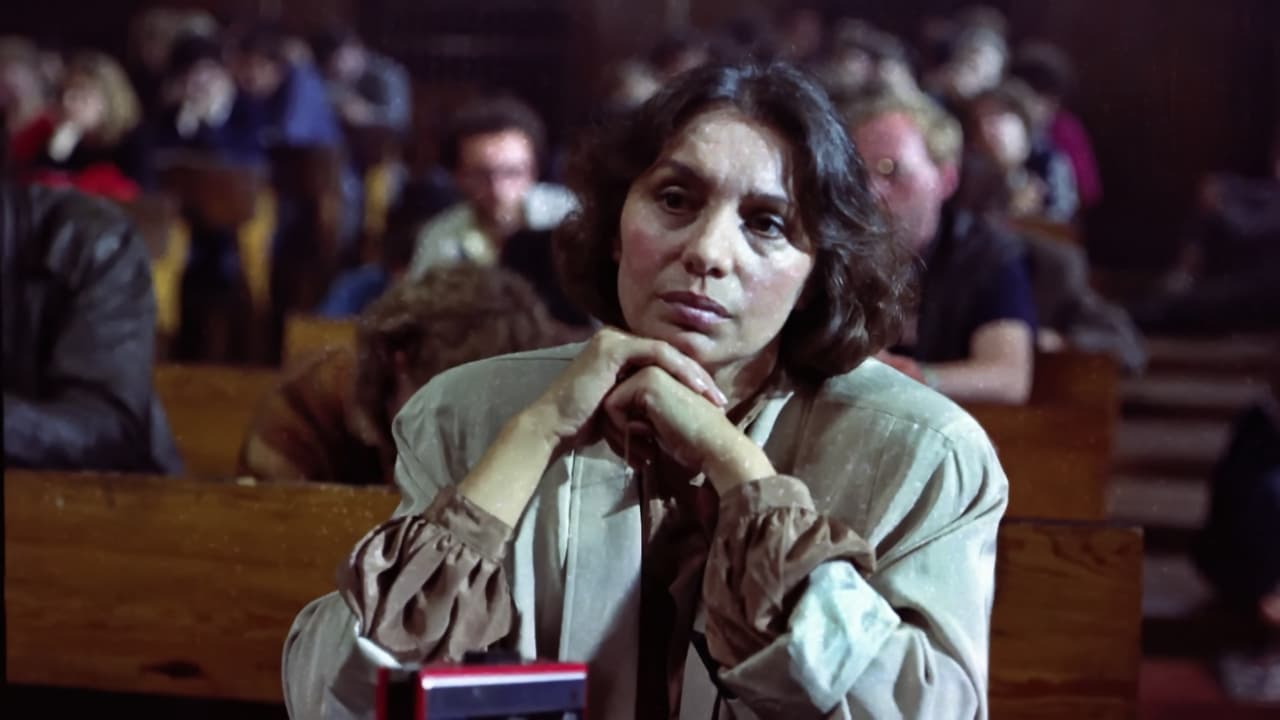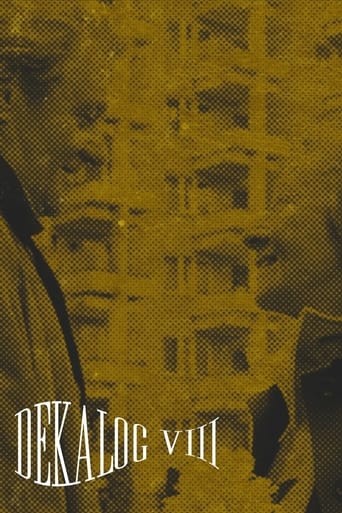

Instant Favorite.
... View MoreExcellent but underrated film
... View MoreDisturbing yet enthralling
... View MoreThe tone of this movie is interesting -- the stakes are both dramatic and high, but it's balanced with a lot of fun, tongue and cheek dialogue.
... View MoreKieslowski's Dekalog are stories of human motivations, the repercussions of human instinct and above all god's impact on our decisions. Dekalog VIII fit in well with the series, it's messages were clearly communicated and the performances were great but I think that the film by itself wouldn't be able to hold up. I feel that Dekalog VIII was a weak contribution.The story was weak in comparison to the other Dekalogs and it lacked the emotional punch of the other films. The part of the film I found most interesting was Zofia's meeting with the contortionist. I believe that this scene is metaphorical for the futility of trying to change what had happened to Elzbieta and the guilt will stay with Zofia forever. Other than the commandment it is based on the theme of this film is guilt and I think that was what I didn't like about the film. Zofia let Elzbieta in her life out of guilt and Zofia's motivations were selfish after the war. Guilt crippled Zofia's life and she was trying to make up for it by teaching economics,teaching people to become better humans. Elzbieta's arrival back into Zofia's life was her redemption. Elzbieta was showered with kindness and answers by Zofia and all the help that Elzbieta needed. Was this because of the goodness that was inside everyone as Zofia put it or was this because Zofia wanted to feel better about herself? I believe in the latter. I think if I re-watched this I would definitely like it and understand it more but as it stands this is my least favourite Dekalog. As always Kieslowki's direction really makes the film and shows a unique vision of these characters. It is worth watching. 7.5/10
... View More"Simuland" him/herself bears false witness by spreading ignorance!: "What Polish underground? That must have been a really exclusive minority. There was no organized effort by any Polish underground to save Jews; whatever Jews happened to be rescued were done so by individuals acting on their own. To claim otherwise, as K. does, is to lie." FACT: Poland had the largest--and longest lived--underground in Europe during WWII! It gave France & Britain a copy of the Germans' enigma coding machine, & helped to crack the code. FACT: Future Georgetown University Jan Karski escaped to England to inform a doubting West of the Holocaust(including meetings with British foreign secretary Anthony Eden and President Franklin D. Roosevelt). FACT: Zegota (the Council to Aid Jews)was a branch of the Polish underground established to rescue Jews from the Nazis.Its express purpose was to aid the country's Jews and find places of safety for them in occupied Poland. Poland was the only country in occupied Europe with such a dedicated secret organization.Simuland then continues to spew his bigotry: "Widespread deep-seated Polish anti-Semitism both predated and survived the Nazi invasion; Poles killed Jews even after the Nazi's retreated. To this day they make life insufferable for the scarce Jews who remain in their country. (I have this directly from a Jewish colleague who grew up in and fled modern Communist Poland.)" There was strong animosity on both sides toward each other. This came from centuries of antagonistic living in close quarters (predicated by Poland's unprecedented religious tolerance--which is why 90% of European Jews lived autonomously in pre-partitioned Poland). While some Poles did kill Jews, it is likewise true that some Jews killed Poles. To blame the entire populations for the actions of the few, would be like blaming all Americans for the actions of the Ku Klux Klan. Many Jews were communists (the 1st. head of the party in post-war Poland, for example), and helped the Soviets to select & deport 2 million Poles to Siberia after Stalin invaded & divided the country with his ally, Hitler, in 1939 (within a year, 1 million of these Poles were dead). The "pogrom" he alludes was political. In the Cold War, Moscow backed the Arabs against the U.S. backed Israel. It directed the Polish Communist Party to rid itself of its Jewish faction. The non-Jewish & Jewish factions of the party were bitter rivals.
... View MoreOne of the most dynamically dramatic episodes of the Decalogue, this particular story also holds in its dialog the key to what drives a lot of the Decalogue segments along: the study of ethics and motivations. It starts out as a discussed reference to Decalogue 2, self-reflectively mocking the attempt to create ethical drama through cancer-patients, and then leads into a much more personal (is that even possible in this series?) look into the histories of the characters involved.The funny thing is that in this one, the drama has already past... which is necessary for connecting to it the idea of the law, "Thou shalt not bear false witness." How does one know how false witness affects negatively the life-station of the people involved could not really be considered so soon after the fact, but instead needs a lifetime of confusion and personal guilt to show an aged person already suffering her own personal hell.What's most interesting about this one is the irony, especially of an ethics professor claiming that the key to moral absolution comes through the survival of the innocent... and yet it is the survival of a young woman who creates her strongest moral dilemma. That is why this episode is the most self-reflexive, because it cannot of itself willingly claim an absolute understanding of events and moral dilemma.--PolarisDiB
... View MoreDekalog 8 introduces a debate about a situation described in the second episode of the series, with regard to some interesting researches about thematic morals made in an unadorned lecture hall. As in a game of mirrors, Kieslowski's magical poetry proposes subtle allusions, references, previous solutions analysed under different points of view.The analysis of Elzbieta's personal story framed within the context of her restless past and recalled in the light of her present time made of painful and unavoidable confrontations proposes the harassing thought about our duty to God, about our moral obligations towards the Christian commandment, "Thou shalt not bear false witness against thy neighbour". Is it possible to be merciful to our fellowmen even at the risk of violating the dictates of divine commandments? Are we allowed to help people even if we are aware about the incompatibility between the ethical principles applied to the evidences of religion and the intention of "bearing false witness against our neighbour" to a good purpose? Is it really possible to give up the idea of getting out of the clutches of the Nazi police a six-year-old Jewish child in the desperate need of a certificate of baptism only on account of moral and religious scruples? The dramatic explanation between Elzbieta, haunted by the memories of her unhappy childhood, and Zofia, the elder woman who refused to give her a passport to safety many years ago, call to our minds a sense of bewilderment and affliction.Both of them are afraid of something going up in smoke around them and nothing escapes their remembrances of a painful past. Sad remembrances of course, because nothing hurts like the truth. Crude in the same manner as a vivisection of the soul. Conjured up with surgical precision in the coldness of an utterly impersonal ambient. Maybe only a cathartic face to face between the two women would give life to new friendly relations made of comprehension, explanations, reconciliations. Kieslowski divides all humanity into two parts: the saviors and the saved. His strict dialectics traces all the uneven steps of the story in a very subtle way. He likes to give back to human dignity its state of primitive and natural innocence, deeply upset by a pressing sense of misinterpreted obedience to the precepts of the Church.
... View More